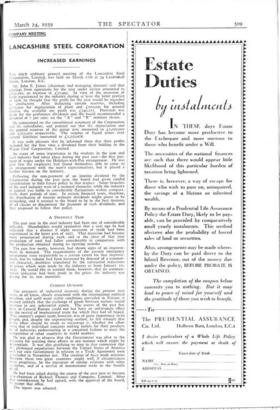- 1NIPANY MEETING
LANCASHIRE STEEL CORPORATION
INCREASED EARNINGS
TIIE ninth ordinary general meeting of the Lancashire Steel Corporation, Limited, was held on March 17th at 34 Leadergiall Street, London, E.C.
Mr. John E. James (chairman and managing director) said that earnings from operations for the year under review amounted to k:855,56o, an increase of £51,995. In view of the recession of trade experienced in the industry during at least the latter portion of 1938, he thought that the profit for the year would be regarded as satisfactory. After deducting certain reserves, including k175,000 for depreciation of plant and £roo,000 for general reserve, the available net profit was £340,113. Provision was made for the preference dividends and the board recommended a dividend of 7 per cent, on the " A " and " B " ordinary shares.
He commented on the consolidated statement of the Corporation and its subsidiaries, and pointed out that the depreciation and the general reserves of the group now amounted to £1,020,000 and £315,000 respectively. The surplus of liquid assets over current liabilities amounted to £1,252,978.
It was with pleasure that he informed them that their profits included for the first time a dividend from their holding in the Wigan Coal Corporation, Limited.
An event of some importance to the workers in the iron and steel industry had taken place during the past year—the first pay- ment of wages under the Holidays-with-Pay arrangement. He was glad that the employers had found themselves able to come to an arrangement with the men's representatives, but it placed a further burden on the industry.
Following the non-payment of an interim dividend by the Corporation during the past year, the board had given careful consideration to their future policy in that respect. Some branches of the steel industry were of a seasonal character, while the industry in general was liable to considerable fluctuations within compara- tively short periods of time. In certain financial years, therefore, the distribution of interim ordinary dividends might prove to be misleading, and it seemed to the board to be in the best interests of all classes to discontinue the payment of such dividends, and they proposed to follow that policy.














































 Previous page
Previous page